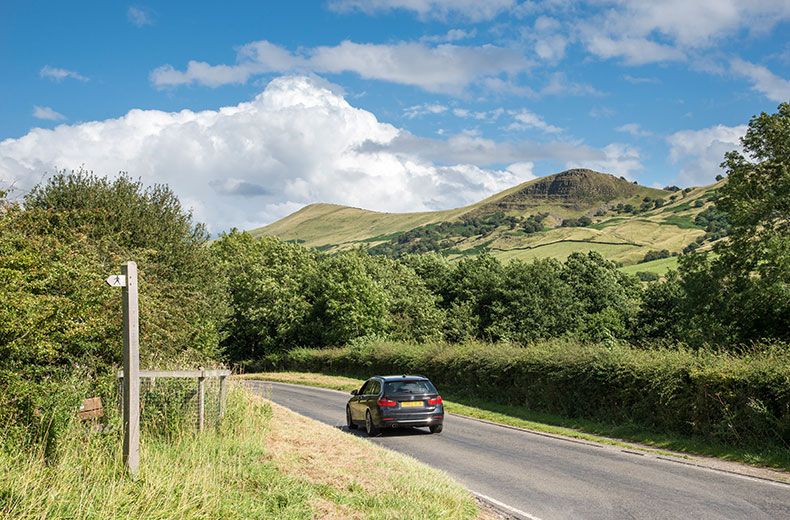Find out how to spot common breakdowns before they happen, what to pack in case of emergencies and the vital pre-journey checks you should be doing to keep you moving this summer.
Have a trip coming up? We hope you won't breakdown, but it's best to be covered by RAC European Breakdown Cover. You can compare European breakdown cover with providers such as the AA and Greenflag, to ensure you get the best value for your money.
Five most common summer breakdowns (and how to avoid them)
1. Battery-related problems
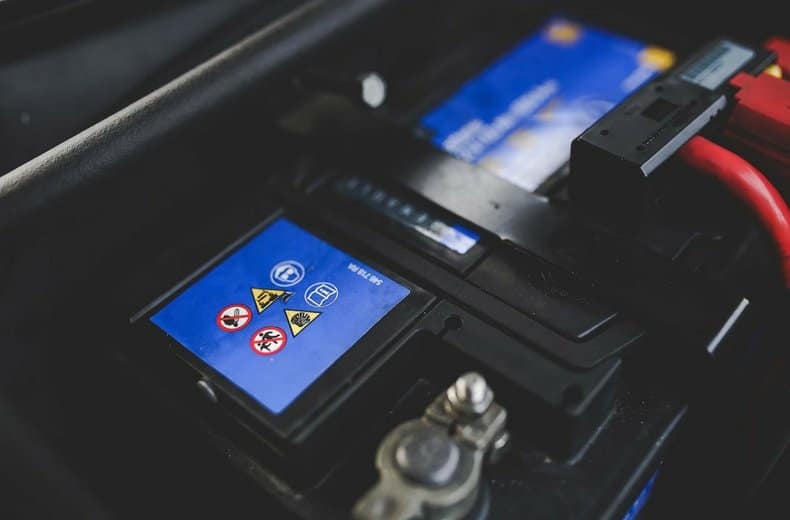
Batteries are the number one offender for causing a summer breakdown. Car batteries have a hard time in winter, but summer can be little easier on them.
Cause
Battery issues rise due to increased stop-start activity, not just in traffic, but more short journeys when people are at home or at holiday destinations.
Also in situations where the whole family is loaded up on long journeys, often in slow traffic with increased number of entertainment devices plugged in; phones, tablets, gaming, dvd’s, sat navs and more, a lot more demand is placed on the battery and the alternator.
What’s more, if you’re crawling in slow traffic, the car’s electrical system may not be generating enough power to replenish this battery drain.
Warning signs
A warning sign the battery is getting low is lethargic starting, also lights might appear dimmer or take longer to turn on and it's possible not all electrics work, such as dashboard lights.
How to prevent
If your battery is ageing, consider replacing it before a long summer road trip. Three-year replacement cycles are a good rule of thumb, as problems can set in once batteries get to four or five years of age.
Be wary about taking lots of short journeys in the summer too, particularly if you have multiple devices plugged in.
If you are using your car regularly for short trips, it may be worth checking and charging your battery at least once a week, particularly if it is more than three years old.
We would also recommend a car battery comfort indicator to help monitor the battery’s condition.
You can find more about how to charge car batteries on our car battery chargers page.
If you are finding that the battery isn’t holding a charge very well at all then it might be time to replace it, in which case we would again recommend either visiting our car battery section or calling The RAC Battery Fitting Service on 0333 2000 999
2. Tyres
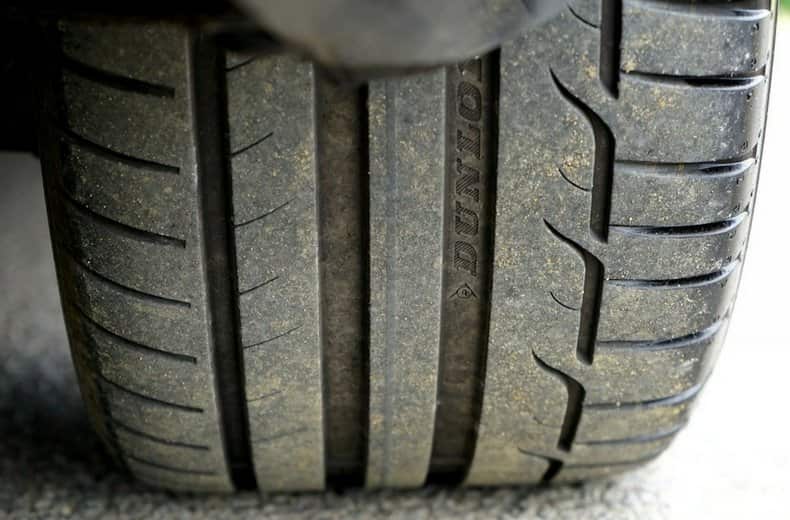
For some car owners, the annual holiday is easily the longest trip they'll take in their car all year.
This can soon highlight any lurking issues with tyres. Cracked, aged rubber may just cope with a run to the shops, but might rapidly fail if subjected to more intensive use.

RAC sale – up to 33% off*
• Roadside cover from £5.29 a month†
• We get to most breakdowns in 60 mins or less
• Our patrols fix 4/5 breakdowns on the spot

Cause
Poor preparation leads to more blowouts as tyres should be checked before any long journey, also during the summer months tyre blowouts often occur on caravans and trailers too - tyre checks are not always carried out on caravans and trailers like they are on your car.
Warning signs
Visual inspections will show cracks or distortions in the rubber, if you regularly check your tyre pressures and notice one tyre often has a lower pressure than the others it could be a sign that it has a slow puncture and needs replacing, or that perhaps the valve is faulty.
How to prevent
It’s vital you check the condition of your tyres, and your tyre pressures, before embarking on a long journey – check against what it says in the car (or caravan/trailer) manual.
Here's a short video on how to check your tyres.
Remember, you need to increase tyre pressure to the correct PSI if you’re planning on carrying heavy loads, such as a car full of luggage and people, before you set off.
You'll find the correct PSI levels you need to inflate your tyres to on the inside of the doorframe or in your owner's manual.
- How to get more from your tyres
- Tyre safety – all you need to know
- Tyre tread depth and tyre safety checks
3. Punctures without a spare
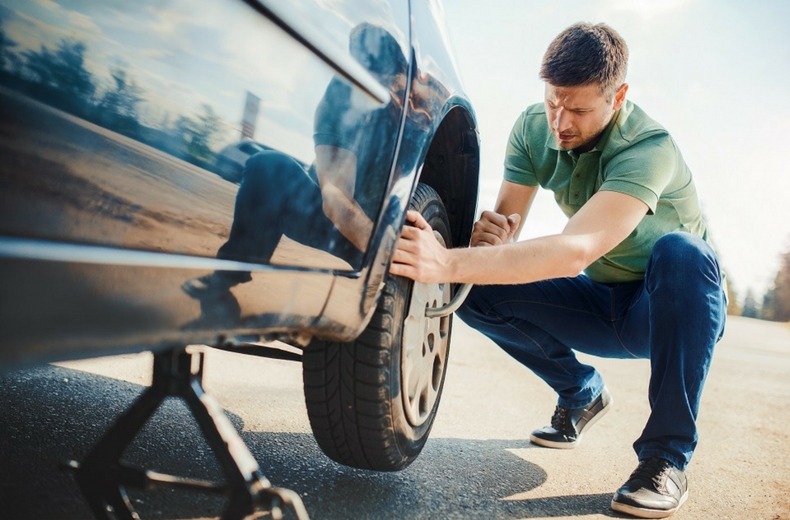
Believe it or not third on the list is actually attending call outs where someone has had a puncture but their vehicle doesn't have a spare.
A puncture can happen at any time - but with many drivers covering more miles in the summer on a greater variety of roads, it can be more likely to happen during the holidays. Particularly when cars are heavily laden with passengers and luggage, putting extra stress on the rubber.
Some drivers might think it’s not a problem, until they open the boot and discover their car doesn’t have a spare wheel, but a tyre repair kit instead. These can work if it’s a minor puncture, but if the tyre is ripped, torn or shredded, a tyre repair kit will be no use.
How to prevent this one is pretty straightforward - check if your vehicle has a spare tyre before you set off.
If it has a tyre puncture repair kit, it's worth familiarising yourself with how this works. Read our full guide on what to do if you have a flat tyre.
If you fall victim to a puncture that you cannot repair, you may need to call our mobile tyre fitting service on: 0800 096 6320, which can source an appropriate replacement for your damaged tyre, you'll need your tyre details to hand to help us source this.
4. Clutch
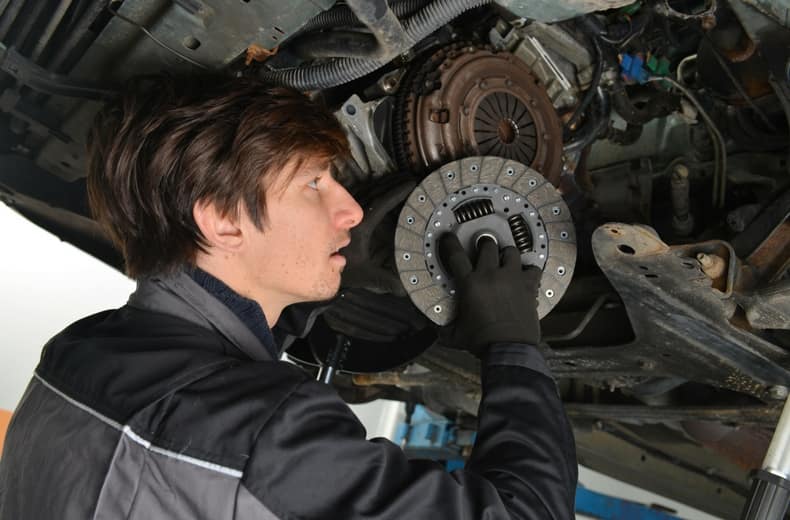
Your clutch can take a real beating in the summer.
Busier roads means they will be used more in slow-moving traffic, while driving on unfamiliar roads in remote locations also takes its toll.
Cause
Driving in unfamiliar locations, perhaps when you weren’t expecting hills or altered terrains often results in added strain on your clutch.
However, a big cause of clutch failure is towing, say our patrols. If you have a caravan and it is incorrectly loaded, this will accentuate any issues, and soon reveal any pre existing clutch issues. Mix together a worn clutch with a heavy caravan and a hilly holiday location, and you’ve got a recipe for clutch failure.
Warning signs
Clutches don’t normally just fail, there usually are signs of wear beforehand, such as a heavy or gritty pedal, a high clutch bite or, simply, signs that your clutch is slipping when you accelerate hard in a high gear at low speed.
How to prevent
Firstly, familiarise yourself with your route and the local roads around your holiday destination.
Secondly, if you are towing, you need to prepare and ensure your car has the right towing capacity for your caravan or trailer. Our complete guide to towing a caravan will tell you all you need to know.
If you have any doubts, or are concerned about any of the warning signs above, book it into a reputable garage and speak to a professional. Getting it changed, isn’t always as expensive as you may fear, and a lot cheaper and less stressful than a holiday breakdown.
5. Alternator
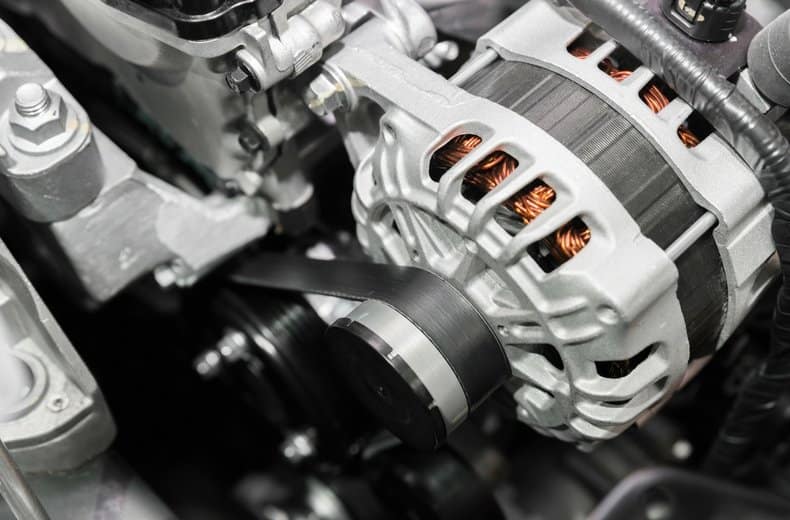
Number five on the list, alternators - a costly repair.
Cause
Alternator issues are related to battery-related problems; this time, it’s excessive demand on the alternator that can cause issues to arise. The drag from connecting more power-hungry devices, combined with hotter weather, will quickly highlight any weaknesses.
Warning signs
A sign the alternator may be failing is the car’s red battery warning light flickering or fully illuminating on the dashboard. It’s red for a reason: pull over and stop the car as soon as it is safe to do so.
Replacements
Alternator replacements are not cheap and fitting a new alternator is not the work of a moment. Often, you’ll need a new drive belt on top, adding further expense. An RAC patrol will be able to recover you to a garage for it to carry out the repair work, but be warned: it’s not an immediate fix.
More summer car maintenance to consider
- Have the cooling system checked – a leaking cooling system or inoperative cooling fan could cause the vehicle to overheat and cause extensive damage to the engine. It’s worth noting that owners of vehicles with air conditioning will often see a small amount of water on the floor – this is perfectly normal and is simply condensation of the air conditioning system.
- The electric cooling fan is designed to run only when needed, it’s worth getting this checked also to ensure it’s operating as it should
- Check the operation of the convertible roof, if your car has one. Especially if it hasn’t been used for some time. Make sure you know how to open or close it manually if needed.
- Also, if your car has one, check the fan belt (sometimes called the auxiliary belt) on a regular basis by your local dealer/garage.
- Inspect the jack and wheel brace making sure they are in correct working order. If locking wheel nuts are fitted, ensure the locking key is safely stowed away in the vehicle. It may be useful to practise changing the spare wheel, following instructions from your owner's handbook. If no spare is supplied with your vehicle make sure you are familiar with the tyre repair kit in case you need it.
- Ensure all dashboard warning lights operate correctly. If not, consult your owner's handbook or call your local dealer.
- Make sure you have a spare set of keys for your vehicle in a safe place.
Things not to worry about
Summer can cause your car to act in ways it might not normally, but don't worry, this isn't always a sign of a serious issue. The following issues aren't things you need to worry about:
Pools of water under your car
These are caused by condensed water from the air conditioning system. Learn more about car leaking here.
Smoke from air vents
Unless the smoke is acrid, it’s just water vapour produced by the air conditioning unit that hasn’t had time to condense. Here are some tips on what to do if your car is smoking.
Roaring from the engine bay
This is the cooling fan turning on and off. Here's some advice on unusual car noises.
Less power
If your car seems more lethargic in summer, this is probably because the air is warmer and less dense, giving the engine a little less “oomph”.
Important pre-journey checks
Remember your car checks with Summer FORCES
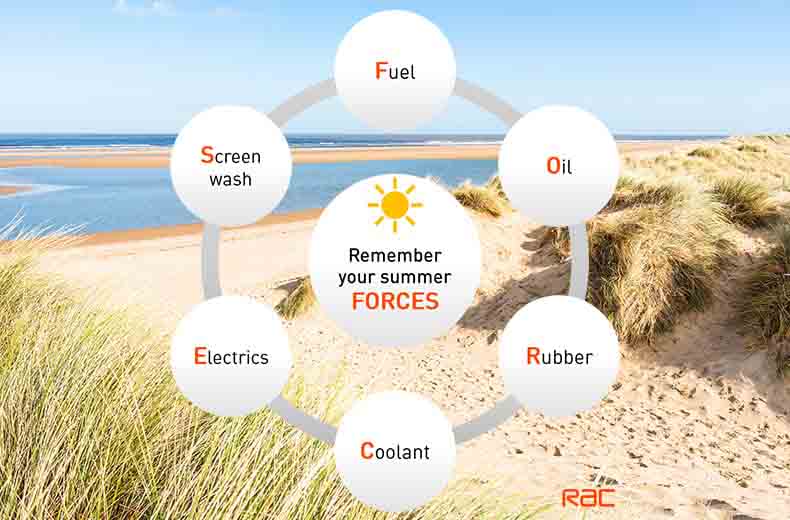
Remember the acronym 'FORCES' and you'll go a long way to ensuring your car is ready for any long drive.
F is for FUEL
Ensure you have enough fuel for your journey. Cars use more fuel in heavy traffic and start/stop conditions which can be regular occurrences, especially in warm weather.
O is for OIL
To avoid engine damage and a potential breakdown, remember to check your oil level and top up when necessary to reduce the chances of overheating in traffic.
R is for RUBBER
Your tyres can tell you a lot about how your car is performing. If they aren’t wearing evenly, then tyre pressures may be mismatched or there could be a fault with the steering.
Check that all four tyres have at least 3mm of tread and are inflated to the correct pressure - this is vital to maintaining good grip in wet and even icy conditions. For everything you need to know about how to check your tyres you can read our how to check your tyres advice complete with short video.
Also take a look at your wiper blades to ensure they're clearing the screen effectively and that the rubber has not perished.
C is for COOLANT
This does a vital job in ensuring the engine runs at the right temperature. If it’s not between the ‘min’ and ‘max’ levels, this could be the sign of a problem so contact a good garage without delay. Here's our video guide for checking and topping up your coolant.
E is for ELECTRICS
Your wipers will help keep your windscreen clear of bugs, and you’ll need your lights on during any heavy downpours. The electrics also control your indicators and windows, so check there are no problems.
S is for SCREENWASH
Top-up your windscreen washer fluid by using a good quality screenwash, nobody wants bugs and seagull poo all over their windscreen after a trip to the beach. Here's how to check and top up your windscreen wash properly.
Things to take in the car
- A first aid kit
- A warning triangle
- A high visibility vest/jacket
- A fire extinguisher
- An empty fuel can
- Additional engine oil and water (for topping up)
- A light bulb kit
- An up-to-date road map or sat-nav
- A fully charged mobile phone and ideally an in-car mobile phone charger
- Take plenty of water and refreshments and take regular breaks
- Take sun cream in case you breakdown, especially abroad
- If you have children, take some games you can play in the car during the journey
- Take extra supplies of medication, you may not be able to get them if you’re abroad
You can purchase a number of these items at the RAC Shop.
Summer driving tips
Towing a caravan
If you're towing a caravan, check the tyre condition – tyres can deteriorate quickly when not used for some time, so check for any cracking in the sidewalls. Also check the braking system, the indicators and brake lights and coupling gear.
Make sure that the caravan is properly balanced with the load distributed as advised by the manufacturer. You certainly don't want to discover you've got an uneven load when you hit the road! In addition, never overload your vehicle or caravan beyond their designed carrying capacity.
It's also a good idea to have breakdown cover arranged. Our caravan and motorhome breakdown cover has been developed with The Camping and Caravanning Club and includes standard RAC Breakdown Cover alongside specialist benefits to cover your caravan.
Vulnerable road users
Good weather makes it a great time for horse riding, cycling and walking, which increases the risk of meeting slow moving animals, vehicles or people just around that next bend.
Horse riders:
If you’re coming up behind a horse, give them enough space and reduce your speed in plenty of time. Horses are unpredictable and can spook easily, so don’t rush up to the back of them or make any sudden noises.
Cyclists and road walkers:
If you’re coming up behind a cyclist or a group of walkers, as with approaching a horse rider. you must give them enough space and reduce your speed in plenty of time.
You can’t be sure of a cyclist's skill level, whether they’re aware of your presence or what they’re going to do next, so it's crucial to pass slowly, giving them plenty of room.
In urban areas with fast moving dense traffic, it’s particularly important to watch for bikes coming up on your left hand side – always give your nearside mirror a quick glance before turning left.
Glare
Bright sunshine can cause major issues for motorists driving in the face of it, and sometimes a sun visor just doesn't cut it.
Summer has a higher chance of clear skies, so always having a pair of sunglasses in the car is good idea - both fashion and safety-wise.
However, there are certain types of sunglasses that aren't suitable for driving, which should never be worn when behind the wheel. Category four sunglasses are illegal to wear while driving as they let less than eight per cent of light through the lenses.
Sunglasses must be labelled in the UK to show the 'filter category number'. Category four should be labelled 'not suitable for driving and road use'.
Variable tint lens sunglasses are also not suitable for driving because modern car windscreen glass filters out UV rays - so the tint on these glasses that becomes darker when exposed to sunlight will not work.
Summer road rage
Rising temperatures and busy summer traffic jams are the perfect recipe for increased stress levels when driving.
- It's important to plan your route in advance, careful to avoid busy driving times and roads if you can help it and ensure you take regular driving breaks.
If you're driving with children, ensure they are happy and comfortable with enough in-car entertainment to keep them occupied and regular breaks to stretch their legs.
Breakdown without cover
Simply call our non-member helpline on 03301598743 to find out how the RAC can help. Learn more about breaking down without cover today.
- Is driving barefoot or in flip flops illegal?
- Air-con regassing: everything you need to know
- What is road rage and how can you avoid it?
To help plan your journey visit our route planner and see the latest traffic news which gives the most up to date road information available including incidents and ongoing roadworks.

RAC sale – up to 33% off*
• Roadside cover from £5.29 a month†
• We get to most breakdowns in 60 mins or less
• Our patrols fix 4/5 breakdowns on the spot


